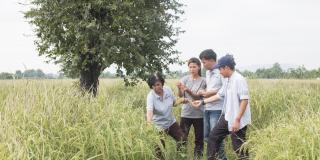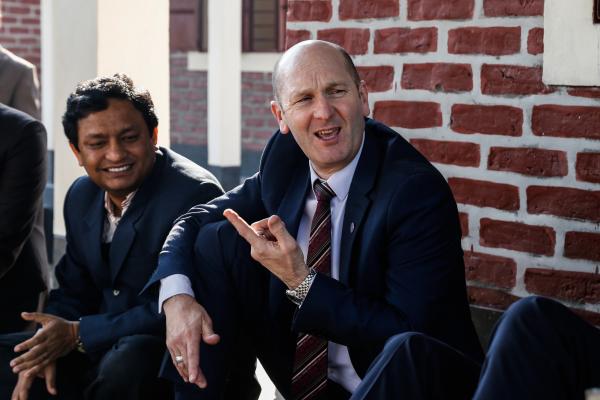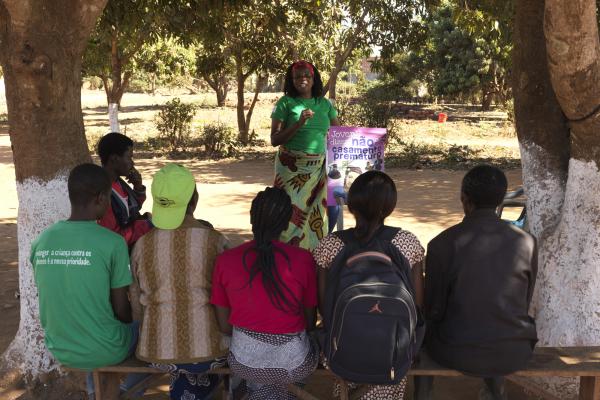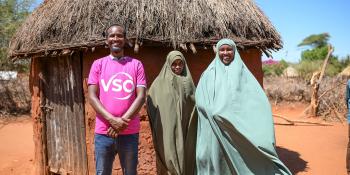
Distributed leadership seeks to maximise organisational performance in conditions of complexity.
Tame and wicked problems
At VSO, our mission is to create a fair world for everyone. We work on issues of poverty, equity, and justice – on trying to make sure all children can read or write, that mothers and babies don’t die in childbirth, that young people have decent employment, that women and girls don’t face violence and discrimination. All of these are complex, social problems.

Understanding how these complex problems are different from other challenges is essential if we are to respond in the right way and provide the right leadership.
Take for example, the rescue of the Chilean miners in 2010. On the 14th October of that year, in a moment that gripped the world, the last of 33 men who had been trapped for over 3 months in a collapsed Chilean mine were pulled to safety. The world watching on was transfixed by their ordeal. Video link-ups were established, food and medicines passed down and an amazing array of technology deployed to recover them alive. So remote did the men feel and so surreal was the technology that a small, rescue pod arriving into the mine tunnel more than 600m underground seemed to have parallels with the first moon landing. Days later, the first miner emerging from that same pod onto the surface of the earth to be greeted by his crying son. It was the culmination of a story that touched something in many of us.
Although the challenge of rescuing the Chilean miners was enormously complicated and challenging, there was a linear, technocratic process for solving them. The mission was clear – get the miners out – and ultimately, we knew whether or not the problem had been solved. In this example, however difficult it was, the leader is effectively a manager ensuring the information is available to understand the problem and to engage the right process and team to solve it (Grint 2010). This is management as “science” and this kind of complicated challenge is what some people call a “tame” problem (Rittel & Webber, 1973).
The kind of challenges VSO face as an organisation are quite different and are sometimes called “wicked” problems. They are complex as opposed to merely complicated. Our challenge as an organisation is to move away from any pretence that the challenge we face is a “tame” one with a simple, technocratic solution.
Similarly, when a leader proposes a simple solution to a “wicked” problem this might appear useful, giving people the certainty they crave. We see this in our politics today. Yet we know that “success” as we commonly understand it will always be elusive as far as “wicked” problems are concerned. A different approach is needed if we are not to destroy the faith of those we lead.
Engaging the entire brain
This is why distributed leadership is such an important concept at VSO. Distributed leadership seeks to maximise organisational performance in conditions of complexity. It seeks to engage the whole organisation in adapting to the reality of the world as we build our understanding of it, rather than the world as we thought it was. It does that by drawing in the combined insight of the organisation – engaging the organisational “brain”.

Distributed leadership recognises that leadership is any activity tied to the core work of the organisation that influences the motivation, knowledge, or practice of other members of the organisation. Leadership comes from engaging in these activities rather than just a formal position. This means everyone is a leader in certain circumstances, whatever their job title or place in the organisational hierarchy.
There is sometimes confusion about distributed leadership because people imagine it is management by consensus, or committee, or that because everyone might be a leader no-one is actually taking decisions. But the opposite is true. When it works well, distributed leadership is much more hard-nosed and faster-paced. But doing it well entails discipline.
Principles of distributed leadership
There are three key principles to delivering distributed leadership effectively: clarity, autonomy and accountability. They are highly interrelated.
In a distributed leadership approach clarity over the strategic framework or organisational intent is crucial. This lays out the terrain in which the organisation is operating.
Within this framework, people across the organisation need to have the autonomy to make decisions in their areas of responsibility.
Finally, they need to be held to account for performance against decisions taken. This last principle is fundamental to building the trust required for autonomy to be sustained. Sometimes the term “earned autonomy” is used because autonomy is earned & trust built, by being held to account for performance against decisions taken.
Across all of this, organisations need to invest in the tools and the capacity of their people to lead. These include time, resources and most importantly, accompaniment and coaching.
Ultimately, surviving and thriving in conditions of complexity is dependent on the quality of the relationships across our organisation. The better we are at connecting to build confidence, capacity and trust, the better able we are to understand our world and to make effective and timely decisions in response.
Read more

A ripple of change: how VSO volunteers are transforming communities
Every act of volunteering begins with a choice — a decision to act out of a desire to make a difference. Across the world, VSO volunteers are proving that one spark of action can ignite something much bigger.

The two volunteers empowering girls and young women in Mozambique
Nelma and Carmirene and are two volunteers working on VSO's EAGLE project in Mozambique. For Nelma and Carmirene, education is not just about school, it is about meeting people where they are and using the right tools to challenging harmful norms. Here are their stories.
Opening doors to safety, education, and a brighter future
For girls in Karamoja, the poorest region in Uganda, being forced into early motherhood is all too common. This Christmas, you can open the doors to Safety, Education, and a Brighter Future.
